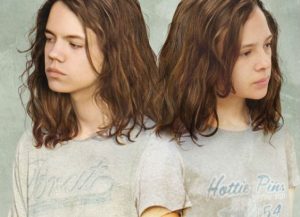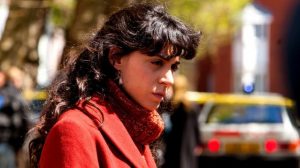The Center for Media & Social Impact at American University is an innovation incubator and research center that creates, studies, and showcases media for social impact. Among the Center’s activities include creative and cutting-edge media projects that address issues of misrepresentation, identity, and social change and to facilitate impact through media via issue briefs, fact sheets, and blogs, etc. As part of the Washington, D.C. Jewish Film Festival Fall Season Lineup (an expansion of the robust Film Festival), the Edlavitch Jewish Community Center is hosting screenings of diverse of films this Fall. The WJFF, now headed into its 27th year, usually runs in late winter/early spring but will be moving to May starting in 2017. It is one of the largest and most respected Jewish film festivals in North America and features an international exhibition of cinema that celebrates the diversity of Jewish history, culture, and experience through the moving image. The films and programs presented are truly as diverse as the Jewish experience. In addition to the main festival, there is also an ongoing, year-round film series, including now in the Fall months, with such films like the ones discussed here. The festival serves over 15,000 people with more than 80 screenings annually, nearly all of which are regional, US or world premieres. Most screenings are followed by discussions with guest filmmakers and subject matter experts. Also included in this supplemental season is Seret DC, which features a diverse group of films and programs from Israel that represent contemporary Israeli life.
On Saturday evening, October 8th, the Edlavitch DCJCC hosted Seret D.C. as part of the Washington Jewish Film Festival’s Fall lineup. Seret (Hebrew for ‘movie’) D.C. features contemporary Israeli films that are especially diverse and presents recent films and shows that highlight all of Israel’s communities, especially those not always given a voice. This evening featured a trio of films/television shows including Fauda, Princess, and AKA Nadia, three interesting and different stories.
Fauda (Arabic for ‘chaos’) is a popular Israeli television show similar to Showtime’s Homeland in that it is a political thriller that features undercover agents desperately trying to find terrorists before they strike again. Fauda is different than Homeland in many ways, most notably in its ability to present its Arab characters in three dimensional and sympathetic ways and similar to the film Ajami (2009) in that it blurs the line between Jew and Arab and shows both sides of the story. In Fauda, we meet the Mista’arvim who learn to speak perfect Arabic, pray at Mosques, and assimilate themselves into Palestinian communities. Doron is a commander of this undercover Israeli unit operating inside Palestinian territories who along with his team, chase down Hamas activist Abu-Ahmed.

The show features many characters (Palestinian and Israeli) yet is easy to follow and quite gripping. It recently received several Ophir Awards, including Best Drama and it is obvious to see why the show is acclaimed and beloved by audiences. Seret D.C. featured the first two episodes of season 1, which set the stage for the hunt for Abu-Ahmed by Doron and his team. Doron is reluctant to rejoin since he recently retired and was convinced he had already found and killed Abu-Ahmed. However, reports indicated Abu-Ahmed is still alive and might show his face at his brother Bashir’s wedding to Amal. The tense drama unfold at the couple’s wedding but does not go according to plan for anyone. If you enjoy thrillers, Fauda is not to be missed.
Next up was Tali Shalom Ezer’s psychological drama Princess, which centers on 12-year old Adar and her unconventional living situation with her mother Alma and her mother’s boyfriend Michael. What becomes immediately apparent is that something is not right. Alma and Michael lack boundaries with Adar and she frequently sleeps in their bed. This unusual situation only becomes more disturbing and obvious as Michael is revealed to be not just “playful” but actually abusive. The film doesn’t tell a simple story of sexual abuse, but rather, has a dream-like quality and makes viewers question reality and fantasy.

Adar befriends a boy named Alan, who looks just like her and even dresses like her. It is unclear whether Alan is real or a figment of Adar’s imagination, or perhaps her way to disassociate from the abuse. The film is shot in such a way that leaves this question open ended, until one especially difficult and undeniable scene. The film’s treatment of gender is quite interesting as Adar and Alan’s gender is rendered somewhat ambiguous and even Michael refers to Adar as “prince” and with male pronouns as a way to get closer to (and perhaps a way to abuse) her. The film isn’t for everyone and isn’t easy to watch but features some excellent acting, most notably from Shira Haas (best known as Ruchami on the hit show Shtisel) and Ori Pfeffer (best known for playing the gay Mossad agent on the USA Network series Dig). What is clear is that Princess is an intimate portrait of a girl dealing with abuse and tells a difficult story in a poetic and unconventional way.
Finally, the last film of the evening was the moving drama AKA Nadia, which presents an interesting story and scenario. The film begins in the late 1980s where Nadia (the incredible Neta Shpigelman) is a 20 year old Arab woman having a secret love affair with PLO activist Nimer (Ali Suliman, best known for Paradise Now and Lemon Tree). The couple flee to London where Nimer is caught by the authorities and Nadia is left alone. Eventually she connects with a man who provides her with the Israeli passport of a young Jewish woman who died in a car crash, and this enables her to return to Israel. Nadia is reluctant to accept this but it is the only way to (sort of) see her mother Amal again.

Fast forward twenty years later and Nadia is now Maya, a successful choreographer married to Yoav (Oded Leopold), a Jewish official at the Ministry of Justice. They have two children, Yael and Assaf. When Nimer suddenly reappears in Jerusalem, Nadia’s past catches up with her. Without revealing too much more, Nadia’s world as Maya begins to unravel and she must face up to her past. It is interesting to note that while many characters in film take political stances, Nadia does not. She tries to remain above the politics and to just be a person, a human, which is perhaps the film’s ultimate message. It is fascinating to watch an Arab pass as a Jew, a Palestinian pass as an Israeli. The film suggests that this is a bit more seamless than one might think and that people are people no matter where they come from. That being said, director Tova Ascher does not provide a simplistic or idealistic happy ending, but rather a sad and realistic one. While the story is tragic, there is still a glimmer of hope. Nadia/Maya is surrounded by men (her brother, Nimer, Yoav) who don’t accept her or understand her but ultimately she finds solace with her Palestinian mother and her Israeli daughter. AKA Nadia is a compelling film and perhaps the strongest featured at Seret D.C.
